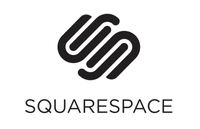• SMB website builder reviews • Choosing an SMB website builder • How we review SMB website builders Our picks for the best small business website builders also offer functionality and tools for enhancing a business’s online presence, such as ecommerce (opens in new tab), bookings, subscriptions, and marketing. For those on a budget, many platforms rank among the best cheap website builders (opens in new tab) too, offering cheaper, professional site creation that enables you to save for other projects. There’s no one builder that works for all business use-cases, and you might be overwhelmed by the choice available. We’re here to help: we review all builders by creating custom sites, testing uptime and response times; examine specific small business tools; compare builders to competitors; discuss and explore pricing in detail; and trial g customer support and service responsiveness Read on to see who we considered the best small business website builders.
The top 3 best small business website builders right now
The best small business website builders available
Wix is a regular feature at the top of lists of the best website builder, and it’s top of the best small business website builders for good reason, too. Take advantage of the Wix ADI (artificial design intelligence) tool to get online fast, or use the more powerful Wix Editor to harness the full power of the platform. Squarespace is best for professional templates and native tools, while GoDaddy and Strikingly offer brilliant, simple editors for those looking to get a site online quickly. Weebly is great for ecommerce functionality via Square (opens in new tab), one of the world’s leading payment processors. 1&1 IONOS’s MyWebsite is an excellent choice for scalable sites, while WordPress, despite not being a site builder in the technical sense, offers excellent design flexibility: though expect to spend time building your site. HostGator’s Gator Builder is a decent budget option, and offers comparable design flexibility to Wix; and Zyro offers another beginner-friendly option with web hosting pedigree. One thing that stands out is the template library, which contains more than 500 attractive designs that you can base your site on. There’s also a great selection of add-ons available via the Wix App Market, and the free forever plan is up there with the best we’ve seen. Wix is a little confusing to start with, though, so expect to spend some time familiarizing yourself with the platform. It’s also at the expensive end of the spectrum, so it’s not a great choice on a tight budget. There are four business-specific plans, with Business Basic - at $23 a month, with 20GB storage - more than enough for most small or medium businesses. Read our full Wix review (opens in new tab) and view our Wix promo codes. If you’ve heard of website builders, the chances are that you’ve heard of Squarespace. It’s one of the most popular site creation platforms in the world, and it’s easy to see why. For one, it offers a neat selection of modern templates that you can use to start your small business site. All plans come with unmetered bandwidth and storage, and there’s a range of great ecommerce tools. The cheapest business-focused plan is the Business package, starting at $26 a month, with Basic and Advanced Commerce plans for those with online sales at $35 and $54 a month. The editor is relatively powerful, but it doesn’t offer the pixel-perfect design flexibility that some of the other options on this list do. It’s also a little confusing, so you should expect to spend some time familiarizing yourself with it when you’re getting started. Read our full Squarespace review (opens in new tab) and view our Squarespace promo code. If your main priority is getting a basic site online as fast and efficiently as possible, the GoDaddy website builder could be your best option. Although it’s quite basic, the editor is simple and intuitive. In addition, GoDaddy boasts a selection of basic ecommerce tools, a full analytics portal, and excellent support resources. There’s also a great free plan that you can use to test the platform, and three premium plans ranging from $19.99 to $29.99 a month, increasing after renewal. The Standard, Premium, and Ecommerce plans are ideal for businesses starting out, growing, or selling online. On the downside, design flexibility is very limited. You won’t have access to any advanced tools whatsoever, which can make it hard to personalize your site. The templates are also quite basic, which can make it hard to build a business site with any sort of size or complexity. Read our full GoDaddy review (opens in new tab) and our GoDaddy hosting review (opens in new tab). With its powerful yet intuitive editor and selection of beginner-friendly site creation tools, Strikingly is another great option for website building newbies. It’s designed specifically for landing pages and one-page sites, and it comes with a suite of unique features. Standout among these are the simple store and blog modules, which you can use to add ecommerce and blogging functionality to your one-page site. The template library is a little limited, and the free account comes with a one-page restriction, but overall, there’s a lot to like here. When it comes to paid plans, the Pro and VIP packages are best for businesses, at $20 a month and $59 a month respectively. Read our full Strikingly review. (opens in new tab)
- Price higher for monthly prices listed in review, because annual sign-ups work out at cheaper monthly payments Weebly is a great choice for small businesses that want to add an online store to their website. It features an excellent range of ecommerce features, and its online store tools are controlled by Square, one of the world’s most popular payment gateways. On top of this, Weebly boasts a selection of templates for sites of all shapes and sizes. Its free forever plan is a neat option for those who want to try the platform before purchasing a subscription, and the premium plans are very competitively priced. For small businesses, Pro, Business, and Business Plus packages (at $18, $35, and $46 a month) offer the best levels of website services as your business grows. Note, though, that the builder is a little limited. You will be restricted to predefined element positions, and it can be hard to achieve the design that you want. Read our full Weebly review (opens in new tab). 1&1 IONOS MyWebsite is a beginner-friendly website builder that’s very competitively priced and backed by a selection of great features. Every plan comes with a free domain, unlimited storage, and unmetered bandwidth. There isn’t any free forever plan, but the introductory prices are very competitive. One standout feature of the MyWebsite website builder is its excellent multilingual site tools. There’s a built-in translator, which can be used to translate your content into 62 different languages. Individual sites support up to 25 different languages at a time, which makes this a great option for small businesses targeting different language groups. When it comes to pricing, MyWebsite offers the Plus and Pro site builder plans at $10 and $15 a month, while for more advanced sites its Now & List Local Essential and Creator + List Local Essential packages (free for the first month, then respectively $17 and $23 a month) offer website builders with marketing and advanced ecommerce functionality. Read our full 1&1 IONOS MyWebsite review (opens in new tab). Now, WordPress isn’t technically a website builder. But it’s such a powerful option for building small business websites that we just couldn’t leave it off this list. WordPress.org (opens in new tab), it should be mentioned, is the free blog and basic site builder, while WordPress.com (opens in new tab) is the paid website creation software and management tool. At its simplest, WordPress.org is a free CMS that provides the dashboard and tools for you to create and manage your website. The design flexibility on offer is unrivalled, and you will have access to thousands of templates and plugins through the official WordPress stores. Bear in mind that you will require one of the best website builders for WordPress (opens in new tab), and then one of the best web hosting (opens in new tab) services (namely, one of the best WordPress hosting (opens in new tab) platforms) to get online, though. WordPress.com’s pricing plans differ when it comes to paying annually or monthly, with the annual plans including a free domain among other features, but costing more. For businesses, the Pro plan is $18 a month, and includes 50GB of storage space alongside a raft of features and tools. You have full code access and complete control over every aspect of your site, enabling you to build exactly what you want. Note, though, that WordPress can be a little confusing to get started with, and it will take you some time to get your site online. Read our comprehensive WordPress review (opens in new tab). Although it’s a relative newcomer to the website building world, HostGator’s Gator Website Builder stands out as excellent. All plans come with unmetered storage and bandwidth, as well as a free domain for the first year. The builder is arguably the most powerful after Wix, and this is largely due to the advanced drag-and-drop interface. Unfortunately, there isn’t a free forever plan or a free trial, but prices are low and there is a 45-day money-back guarantee. Even the cheapest of the three plans, Express Start at $3.84 a month, features a free domain, three email campaigns a month, and a three product online store. Scaling up from there, the most expensive plan is Express Store at $9.22 a month, which offers 10 email campaigns a month, unlimited products on an online store, and no transaction fees should you choose to utilize ecommerce. Read our full HostGator review (opens in new tab). Zyro is one of the most intuitive website builders in the world, from leading web host Hostinger (opens in new tab). The designer is a little on the simple side, but it’s still more than good enough for those looking to get a simple site online with a minimum amount of fuss. One standout feature is the company’s excellent customer service, which includes online live chat and email ticketing. There’s also a neat set of AI tools, including an AI writer, logo builder, and blog title generator. Benefit from simple ecommerce tools if you want to add an online store, and select a design from the template library base your site on. On the downside, prices are quite deceptive, and you can expect to pay significantly more than the advertised price when it comes time to renew your subscription. The Business plan is $11.49 a month, and offers unlimited bandwidth, storage, free emails for three months and a free domain for a year, with more advanced plans offering ecommerce functions. Read our full Zyro review (opens in new tab) and view our Hostinger coupon codes.
Choosing a small business website builder
How we review the best small business website builders
We review all website builders in similar ways, whether reviewing those focused on small businesses, ecommerce, or free blogs. First of all, we test the builder and editor by creating custom sites. In doing so, we can then say for sure where the platform resides on the difficulty scale, between beginners and advanced users. If you want ecommerce tools, remember that not all builders offer ecommerce. Remember also to check if you require web hosting on top of your builder: this isn’t likely, but it’s important in particular if choosing WordPress. Consider how much time you can spend building your site: choose a beginner-friendly builder like Weebly or GoDaddy if you want a site finished quickly and easily; opt for a more powerful option like Wix if you want to spend more time finalizing your site’s look and feel. What’s key to remember, however, is that most builders are available on free trials or free-forever plans (opens in new tab). As such, it can quite literally pay off to spend time researching builders before you choose; testing each out for free; and then opting for the paid plan from the provider you’ve earmarked. • Choose a domain name (opens in new tab) • Register your domain (opens in new tab) • Implement website security (opens in new tab) • Enhance website branding (opens in new tab) • Find free website content (opens in new tab) • Make your site accessible (opens in new tab) • Understand web SEO (opens in new tab) • Undertake website audits (opens in new tab) We test our site’s uptime and response times once online, as these metrics are integral to website performance. If your business site is offline or slow to respond, you can lose custom, money, and time. On a more specific, small business-focused site basis, we examine specific small business tools and features, which could be ecommerce-related, or could be more targeted elements like AI tools or content creation. We compare builders to competitors, and discuss and explore in detail what each pricing plan offers, so you know which one to invest in for your business site. Other common areas of our reviewing process include examining platform-specific features, as well as trialling customer support and service responsiveness and knowledge. The last thing you want is to have a problem with your business site, and then have a slow-to-respond, less well-informed support service. We’ve answered a number of questions about the best small business website builders below, to help guide you towards making the right choice for your new site.
Further reading on website builders and web hosting
Learn more about drag-and-drop (opens in new tab) editors, as most small business website builders utilize this technology. If you’re wondering about web hosting, discover the differences between web hosting, WordPress, and website builders (opens in new tab); and learn what web hosting is (opens in new tab), and how to choose a web hosting service (opens in new tab). Many of the leading platforms offer small business-specific features and tools, which include ecommerce functionality; marketing and email tie-ins; business and SEO analytics; and much more. The top builders generally offer business-tailored plans and packages, so you won’t have to go far to find what you’re looking for. • Wix vs Squarespace (opens in new tab) • Squarespace vs Shopify (opens in new tab) • GoDaddy vs Wix (opens in new tab) • Wix vs Squarespace vs Weebly (opens in new tab) • HostGator vs IONOS vs GoDaddy (opens in new tab) When it comes to the providers featured, check out our step-by-step guides outlining how to make a website with Wix (opens in new tab), with Squarespace (opens in new tab), with GoDaddy (opens in new tab), with Square Online (opens in new tab), with HostGator’s website builder (opens in new tab), and with WordPress (opens in new tab).










